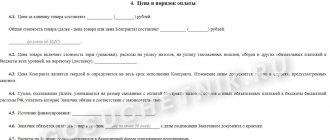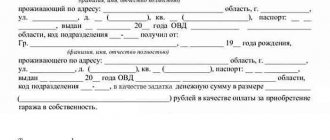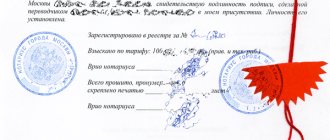Author of the article
Yuri Karlovich Pilchevsky
Reading time: 5 minutes
AA
Material updates: 2019-05-03 12:50:52
Many people planning to purchase real estate are wondering: is it allowed to purchase an apartment with registered minor children? What is needed for this and what is the procedure? What pitfalls await you on the way to a deal and what should you be wary of? According to Russian legislation, the sale of an apartment with children registered in it is permitted, but subject to a number of conditions that will be discussed in detail in this article.
Legislative acts
Young children and adolescents who have received a passport but have not achieved legal capacity cannot independently protect their property and civil interests, therefore the state regulates the norms of housing law provided for this category of citizens. Accordingly, the sale of an apartment with a registered child is provided with additional measures to protect their interests . These include sources of legislation.
- Article 20 of the Civil Code of the Russian Federation – place of residence of the child.
- Articles 130, 131, 292 of the Civil Code of the Russian Federation – transfer of rights to real estate.
- Articles 26, , 37 of the Civil Code of the Russian Federation - the rights of a minor.
- Article 27 of the Civil Code of the Russian Federation – emancipation.
- Article 60 of the RF IC – property of a minor (ward).
- Article 70 of the Housing Code of the Russian Federation – registration of a child.
- Article 19— Guardianship Law.
You should also take into account the provisions of Law No. 256-FZ dated December 29, 2006, regulating the mandatory registration of a child in residential premises purchased with maternity capital funds, which is provided for on the basis of the Russian Federation Regulations dated December 4, 2009 No. 994.
And also, a significant role in such cases is played by the Federal Law, adopted on December 29, 2015 under No. 391-FZ, amending some legislative acts of the Russian Federation. In particular, it regulates the obligation of the parties to a transaction when buying and selling an apartment with children registered in it, to notarize the transaction agreement.
Nuances when registering real estate if children under 14 years of age are registered there, and from 2 to 5 p.m.
Minor residents under the age of 14 do not have legal capacity to such an extent that all actions in their interests are required to be carried out by legal representatives, as stated in clauses 2 and 3 of Article 37 of the RF IC and Articles 19-21 of the Guardianship Law.
REFERENCE: Legal representatives include parents (adoptive parents) and guardians (trustees).
If the minor is the owner, then all actions related to the transaction are carried out by legal representatives, upon receipt of special permission from the guardianship and trusteeship authorities. In other cases, parents or guardians will need to obtain permission, with a formalized obligation to register the minor at a different address. In addition, a child can only be registered together with his parents, or with one of them.
At the age of 14-17 years (inclusive), adolescents acquire partial legal capacity , based on paragraph 1 of Article 28 of the Civil Code of the Russian Federation and Articles 19-21 of the Law on Guardianship. Therefore, being the owners of the property, they can independently sign all the documentation on the transaction, and parents or trustees only affix a certifying signature indicating their consent to the transaction. The same applies to registration, in which a teenager who has received a civil passport can participate independently, with the permission of parents or guardians.
At this age, the child can register with any of the relatives, which makes his discharge easier, provided that grandparents and other relatives have living space with whom the new owner can sue.
Risks and problems
The buyer of an apartment in which a child is registered falls under the authority of the above laws, by virtue of which he may receive the following legal consequences:
- take possession of the property, but receive an encumbrance in the form of a woman registered in the premises with a child or several children;
- participation in lengthy legal proceedings related to the removal of unwanted residents from one’s own area;
- terminate the transaction due to refusal of discharge by the mother and children;
- declaring a transaction voidable if the documentation package for the transaction is incomplete, or if the rules for concluding a transaction are violated.
That is, having bought a home, the owner of the apartment will be legally helpless. Subsequently, selling such an apartment will be fundamentally difficult, since the transaction may be considered “not clean” and has an encumbrance.
IMPORTANT: The right to registration is reserved for a mother with minor children until they turn 18 years old, or until the woman acquires the right to use residential premises at a different address.
Another important detail that can lead to risk is the dishonesty of the apartment seller. For example, a package of documentation for a transaction fully completed by the guardianship authorities represents full legal capacity to purchase and sell.
However, if the legal representatives do not purchase the promised housing in return, or do not purchase it within the framework established by the guardianship authorities, they, in turn, will file a prosecutorial complaint or a lawsuit in court, legally protecting the rights of the child. In most similar cases, such transactions are terminated by the sale and purchase of an apartment.
Situations when it is impossible to remove a minor from registration
Sometimes all attempts by the property owner to defend their property interests turn out to be useless. Despite his constitutional rights, he remains defenseless against the norms of legislation protecting the interests of children. Please note that it is impossible to discharge a child:
- to “nowhere”, that is, without a new registration;
- without the consent of the mother, if she does not have her own home and permanent place of residence.
Therefore, it is impossible to simply remove such a tenant from the registration register at the whim of the owner. According to the requirements of the guardianship authorities, upon discharge after the transaction:
- indicate the address where the minor is traveling;
- confirm that the new conditions are equal to or better than the previous ones.
The discharge of a minor to a residential premises, the living conditions in which differ in the direction of worsening, may be prohibited by the Authorities.
ATTENTION: Unscrupulous citizens often use these laws for fraudulent purposes, continuing to live in the apartment they sold.
How can a buyer protect himself and avoid difficulties?
To avoid problems that may result from registering children in the purchased apartment, it is best if parents with minors and teenagers register in advance, before the transaction is completed. This is the most correct option, under the following conditions:
- after discharge, the family will be registered in a new place, with normal living conditions that will satisfy the guardianship authorities;
- children under 14 years of age will be registered together with their parents, or with one of them;
- will present the buyer with an extract from the house or apartment register certifying the fact of registration at the address.
If children have already received a passport, it is permissible to issue them to relatives without parents , which should also be confirmed with documentation - by presenting an extract. If a minor is the owner of the purchased apartment, then the documents issued by the guardianship authorities must be checked. It should be borne in mind that failure to comply with the instructions received by legal representatives will lead to the cancellation of the transaction.
Accordingly, the contract should take into account all the nuances of the transaction so that possible termination does not cause property damage to the buyer. In particular, introduce a provision that in the case of bilateral restitution, he receives in full all the money transferred under the transaction to the seller, so as not to receive it in small portions for 15-20 years, losing the advantage of using it.
Risks of buying a home with minor children
For the buyer, such a purchase is associated with the risk of challenging the transaction in court.
If the court finds that the property interests of children have been violated, the purchase and sale agreement will be canceled and the parties will return to the starting point: ownership of the apartment will pass to the buyer.
Certain risks are associated with apartments acquired through privatization. In this case, the buyer should carefully analyze the extract from the house register. If at the time of privatization a minor child was registered there, but was not included in the ownership, then his rights were violated. In such an apartment, a child can retain the right of unlimited use if he goes to court.
Obviously, one should refrain from concluding such a deal. The exception is situations where the refusal to privatize a child has received the approval of the guardianship authorities, but the possibility of such a combination of circumstances is minimal.
Also, controversial issues may arise if the child was discharged from the apartment shortly before privatization or was temporarily discharged from it while this procedure was in progress.
He can also restore his violated rights through the court.
There are some risks associated with buying an apartment with two minors. If this property was purchased using maternity capital, then the parents were required to include children among its owners.
If parents ignored this requirement, they also violated the property rights of their children. The main problem is that the issue of allocating shares when using maternal capital is poorly monitored.
Step-by-step instructions: how to buy real estate if there are minor tenants in it
Inspection of the premises
Once a property has been selected for the transaction, you need to inspect the premises. If it meets the requirements, check the documentation for the purity of the transaction. Here all documentation has legal value. Including an extract from the apartment register. If it lists registered children, then you need to talk to the property owners and ask the mother and child to register before the transaction is completed.
If he refuses, ask him to give reasons. If the refusal is motivated by objective reasons, then the buyer chooses between purchasing the apartment he likes and searching for a new property. If the sellers’ answers are in doubt, then the best option is to refuse the deal.
When purchasing such an apartment, the actions of the parties will be as follows.
- You need to contact the guardianship and trusteeship authorities at your residence address.
- Next, the owner writes a statement of intention to carry out the transaction.
- To confirm the legality of the actions, it is advisable for him to enter into a preliminary purchase and sale agreement (PPSA) for the purchase of a new home. Then the application will indicate that a new living space is being purchased at the expense of the apartment being sold.
The following must be attached to the application:
- buyers' passports;
- birth certificates of their children;
- a copy of the PDCP;
- a copy of the extract from the Unified State Register of Real Estate for the apartment purchased by the sellers;
- a copy of the extract from the Unified State Register of Real Estate for the apartment for sale.
Conclusion of a purchase and sale agreement
After receiving permission from the guardianship, the second step is taken - concluding an agreement . If the seller concludes an alternative deal, or he has already selected a new home for purchase, you can do without concluding a PDCP by drawing up and signing the main agreement. When drawing up a deed of sale, it is necessary to provide for all the nuances that may lead to the family’s refusal to be deregistered.
Therefore, the provisions of the contract must include:
- rights and obligations of the parties, with a mandatory indication of the need for an extract;
- deadlines for vacating the premises;
- discharge dates;
- liability for unfulfilled obligations;
- conditions for termination of the contract.
Notarization
The agreement drawn up in triplicate is signed by the parties, after which the third step is taken - certification of the bill of sale. in the notary office at the location of the property can certify the purchase and sale agreement
REFERENCE: Notarization of the contract requires payment of a state fee and payment of the cost of technical work, if the contract was drawn up here.
Registration of a transaction
After certification by a notary, the property transaction agreement is subject to registration on the basis of the provisions of Article 131 of the Civil Code of the Russian Federation and Law 122-FZ of July 24, 1997. Registration of the transaction is the fourth step, which, if the outcome of the case is favorable, will be the last. To register, the parties apply jointly to Rosreestr, or submit a package of documentation through the MFC.
This will require the transfer of new contracts and a package of documentation involved in the transaction. A copy of the guardianship permission is also attached to it. The registrar checks the documentation, accepts it against signature and sets a date for a return visit.
On the appointed day, upon presentation of a passport and receipt received at the MFC, the buyer receives:
- transaction agreement with a registration mark;
- extract from the Unified State Register of Real Estate.
From this moment on, he is considered the legal owner of the apartment.
A purchase and sale agreement certified by a notary is exempt from paying the registration fee.
After the seller has received his copy of the bill of sale with a registration mark, he has the right to go to the passport office and write an application for an extract, together with his minor children. You must register at your new address within two weeks. Simultaneous registration at a new address, with an extract from the premises where the family previously lived, is also permissible. Both options are legal and at your discretion.
Package of documents required to authorize guardianship
The list of documentation required to obtain permission varies depending on the regional division of the Guardianship Authority.
Representatives of the organization act in accordance with the approved regulations for issuing permits. But the standard set of documents includes:
- Application for permission signed by parents or child over 14 years of age.
- Documents confirming the child’s identity: birth certificate or passport (if available).
- Documents for the apartment being sold and purchased, confirming the ownership rights of the seller and the buyer: certificates of ownership, extracts from the Unified State Registration Register/Unified State Register.
- Current extracts from the Unified State Register of Real Estate, containing an indication of the absence of encumbrances and the cadastral value of the property.
- Passports of parents (if one of them died or was deprived of parental rights - death certificate, relevant decision of the judicial authority).
- Technical passports from the BTI, sometimes additionally copies of floor plans and explications for both real estate objects are requested.
- An extract from the house register received at the passport office.
- A copy of the financial and personal account received from the EIRC or the Unified Housing Document.
- Details of a bank account opened in the name of the child (if instead of allocating a share, money is supposed to be transferred to him).
Inspectors may also request additional information.
The received documents are reviewed by a special commission, where the issue of issuing permission to conduct the transaction is decided.
Every buyer should know how to check the purity of the transaction when buying an apartment. Don't have time to search for an apartment to rent? Find out from our article how to rent housing through an agency.
When conducting any real estate transactions involving minors, certain rules must be followed. They are described in detail here.
Algorithm for discharging a person from acquired housing who has not reached the age of majority
If the seller deceived the new owner and did not check out, then he will have to deal with this issue on his own by going to court. Only with the consent of the jurisdictional authority is it permissible to discharge a mother and children. But you must first notify her of your intention to go to court. It is better to send the notification by Russian Post to the address that was indicated as the place of future residence to the guardianship authorities.
If there is no response to the sent request within a month, a lawsuit can be filed. You need to file a claim with the district court at the location of the house with the apartment where the previous residents are illegally registered (Article 28 of the Civil Code of the Russian Federation). Here a statement of claim is written, in which all the circumstances of the case are indicated; special attention must be paid to the points.
- Under what circumstances was the apartment purchased, when the ownership was registered and the transaction agreement was certified by a notary.
- What is specified in the agreement regarding the deregistration of previous owners - list in detail, point by point.
- What guarantees did the seller give regarding the family’s discharge? Provide a link to existing documentation.
- Explain that all standards were followed properly, including contacting the guardianship authorities.
- Be sure to indicate that before going to court, a notice was sent to the defendant demanding deregistration at the specified address.
The request asks the court to “Admit the claim in full. Allow the deregistration of citizens (indicate last names) with minor children (indicate last names). When filing a claim, the following required documentation is required:
- passport;
- contract of sale;
- extract from the apartment register;
- postal notification of sending a letter to the defendant;
- receipt of payment of the duty (300 rubles).
In addition, you must attach evidence that the extract was requested legally . For example:
- cadastral extract about the availability of housing for close relatives of the seller;
- a copy of an extract from the Unified State Register of Real Estate on the acquisition of new residential premises by persons;
- certificates from guardianship;
- other documentation confirming the legality of deregistration.
By decision of the court, the owner of the apartment has the right to remove parents and children from the register.
REFERENCE: If the court refuses to recognize the claim, then within 10 days you can file an appeal to the regional court.
Read about how to discharge a person registered in a purchased apartment here.
If you want to learn more useful information about buying an apartment, then especially for you we have prepared interesting materials about:
- what the buyer needs to know when making a transaction;
- what costs the buyer bears;
- how to register an apartment for a minor;
- How to transfer money to the seller.
How to sell an apartment with a registered minor?
It is preferable that at the time of signing the contract there are no children registered in the premises. Consequently, the purchase of an apartment with registered minor children begins with their registration.
How to deregister children?
These issues are regulated by Art.
26, 28, 37 Civil Code of the Russian Federation, art. 60 RF IC, art. 26 Housing Code of the Russian Federation. According to legal norms, deregistration is possible if the following conditions are met :
- The child must be provided with an alternative living space that is not inferior in size and conditions to the previous one. For example, if before moving a minor lived in a room measuring 12 square meters, then after moving he must have the same room or a larger one.
- If the parents live separately, the child can be discharged if the consent of both parents is obtained. When a child is registered in one place and lives in another, deregistration is possible only by going to court. According to Art. 20 of the Civil Code of the Russian Federation, a minor can only be discharged to the premises where his parents (parent) or guardian are registered.
Discharge procedure
If the children are the owners of the area or part of it, then the housing can be sold, but the consent of the guardianship authorities will be required. A child’s renunciation of his right does not exempt him from the need to obtain permission from the Authorities. If a minor is only registered (does not have property rights), then the procedure for removing minor children from the apartment changes and there is no need to contact the Authorities.
To obtain permission from the Authorities, the following documents will be required:
- Passports (certificates) of all parties to the transaction.
- An extract on family composition, which must be obtained from the passport office.
- An extract from the Unified State Register reflecting information about the ownership of the premises being sold.
- Preliminary contract for the purchase and sale of new housing.
- Registration certificate for an apartment when selling an apartment and for a purchased property.
The listed documents must be submitted to the Guardianship Authorities by both parents (even if they are divorced) and in the presence of the child himself.
If the minor is 14 years of age or older, he will be required to provide written consent to enter into the transaction.
The application is considered for 14 days, after which, if no violations of the requirements of the Law are detected, a document on a positive decision is issued. The refusal can be appealed to a district or regional court. It should be taken into account that magistrates' courts do not have the right to resolve these issues.
If consent from the Guardianship is received, you can begin to formalize the transaction and register the purchase and sale agreement.









